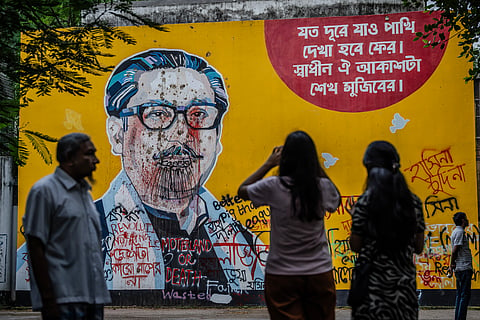

NEW DELHI: More than a fortnight after the interim government took over in Bangladesh, anti-India sentiment remains high in the country, say political observers.
"Anti-India sentiment is high in Bangladesh at present and pro-Pakistan sentiment is in the ascendant. This could impact bilateral relations between India and Bangladesh, especially the defence partnership which could now be re-established between Bangladesh and Pakistan," Professor Nazmul Ahsan Kalimullah, a senior political commentator from Bangladesh, told The New Indian Express.
The other projects that India has been working on in Bangladesh too could get impacted. The $1 billion Teesta river restoration and comprehensive management project that former PM Sheikh Hasina had announced in July is unlikely to happen now, according to a source in Dhaka.
Just two days back, Pakistan’s Prime Minister Shehbaz Sharif had voiced his approval of Bangladesh protesters bringing down statues of Bangabandu Sheikh Mujibur Rahman.
"What goes around comes around," Sharif said referring to demolition of Mujibur Rahman’s statues, adding that one who spearheaded the anti-Pakistan movement has met the same fate.
Barring a few Awami League leaders, nobody in Bangladesh has condemned this statement.
"It's the duty of the country to protest the language in which Sharif has mocked our national struggle," said Awami League joint secretary AFM Bahauddin Nasim.
Meanwhile, minorities which includes 5 per cent Hindus continue to be targeted – they are being forced to resign from their jobs and it’s a matter of time before they leave the country for safer places.
Academics, journalists, local officials and political opponents continue to be rounded up while the interim government turns a blind eye.
Radicals are taking over in some parts. In the village of Tahirpur in Sunamganj, music has been prohibited and people have been threatened with punishment if they dare to play any musical instrument or sing.
The regime has shifted from Hasina-led autocracy to Islamic fascism, say academia in Bangladesh, hoping that this is just a bad dream which doesn’t turn into a harsh reality.